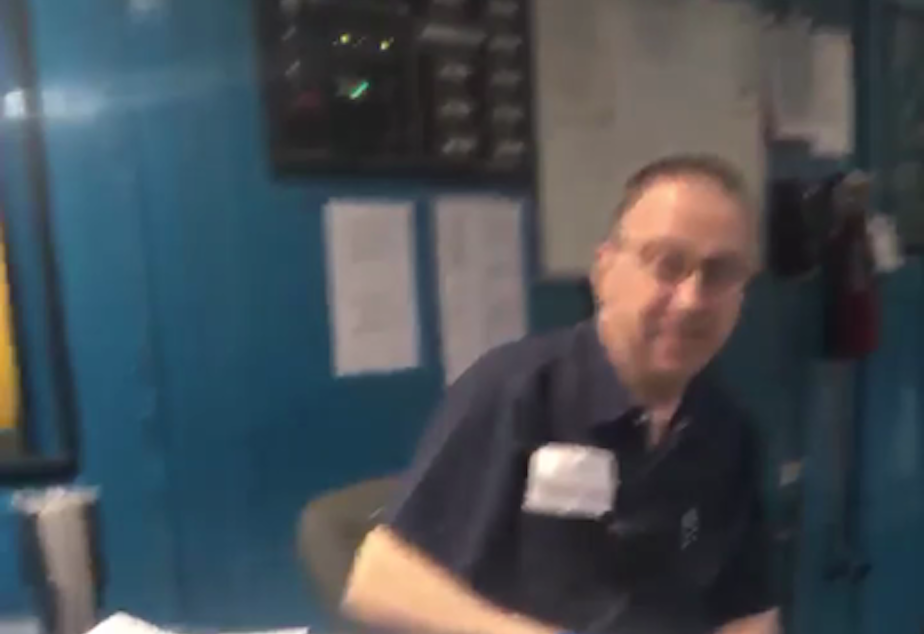Dozens of layoffs ahead as Seattle Times closes main printing plant

At one time, the massive plant in Bothell had close to 140 press operators printing papers around the clock. There are just 18 operators today running half of the presses in the middle of the night.
One of them is Tyrone Love, a shop steward who has worked at the plant since 1996.
Tyrone loves newspapers.
“No matter where I go,” he said. “I have to get a paper.”
When he visited family on the East Coast last year, he picked up copies of The New York Times and Washington Post – thrilled to hold newspapers he doesn’t often see around Seattle.
“When I go to Riverside, California, I get a Press-Enterprise or a L.A. Times,” Love said. “Maybe come across an old San Bernardino Sun.”
Riverside is where Love got his start printing papers. He was an apprentice at The Press-Enterprise for four years in the late 1980s. After that he got his first job at the Las Vegas Review-Journal, describing his three years there as “doing time.”
Sponsored
Love discovered Seattle when he drove through the area for the first time during his honeymoon. On their way to Vancouver, B.C., he and his wife decided the Northwest was where they wanted to buy a home and start a family. Love also had his eye on the sprawling printing plant north of Seattle he heard was hiring press operators.
In June 1996, Love was the 86th employee to be hired at the plant located in the North Creek community of Bothell.
“It was good. Lots of work,” he said. “The area was really nice. It wasn't too crowded. It was a good place work."
North Creek was also Love’s first taste of the union, which he liked a lot. He made fast friends with other operators and four years ago was elected to be a shop steward. For almost three decades, Love and his coworkers relied on the steady work and good pay in the quiet suburb north of Seattle.
“Guys used to raise their families with this job, send their kids to school, college, bought homes and retired,” Love said.
Sponsored

 18 secs
Thousands of copies of The Seattle Times being printed at the paper's North Creek plant before it closes in March
18 secs
Thousands of copies of The Seattle Times being printed at the paper's North Creek plant before it closes in March
But Love said the plant has been slowly losing business since he started. The plant used to print the Seattle P-I, too, until the outlet went to online-only in 2009. Classifieds sales also dwindled, he said, with the popularity of Craigslist and similar websites.
“We used to print over 200 some-odd thousand, close to 300,000 copies,” Love said. “And it was all classified, which is all money, and that disappeared. Right now you can barely get a page in half a classifieds if you're lucky.”
Readership of physical newspapers went down, too. Even if young people do want the news, Love said, they’ll find it online. Older readers, once a stronghold for the industry, can no longer sustain it.
“As we move on and die off, that's a subscription gone,” Love said. “How do you combat that? How do you get people to read the paper who don't read the paper, who never read the paper?”
Sponsored
The plant Love discovered in the 1990s, roaring with business and activity, has slowed to just two of the presses running only at night. That’s why, when he heard in April The Seattle Times would be closing the plant, he wasn’t shocked. He said it was only a matter of time. He now refers to the plant as a “ghost town.”
On New Year’s Eve 2019, the paper reported to the Washington State Department of Labor and Industries there would be 42 layoffs with the plant closure. A spokesperson for Seattle Times said that number might change depending on how many employees are transferred to the paper’s smaller plant in Kent.
Love ran through a mental list of the remaining North Creek employees and thinks 42 is about right. There are four electricians employed there, for example, and Love thinks Kent will need just one. Many of the workers being laid off have already gone through this before at other press plant closures, Love said, and nearing retirement.
“There's no new people come into the industry because apprenticeships are all but gone,” he said. “So the only people working in the industry are guys who have been in for a long time.”
Love said he will not be going to the Kent plant. His decades-long love for printing papers is over. The land the North Creek plant sits on will be developed into town houses and the huge presses inside will not find a new home. Love said typically when a plant closes, machinery is sold to other plants and presses are often piecemealed together.
Sponsored
“Unfortunately now that didn't happen,” he said. “So all the machinery there that I currently work on is going to be demolished.”
For the few younger workers at North Creek, Love said he sees the anxiety in their eyes. They’ve bought homes in the north end and worry about having to commute or move to Kent. Love tells them now is a good opportunity to change their careers.
"I tell guys nowadays: think about moving on. Think about learning a new trade or going to school,” he said.
What Love wants to do next is drive a bus for King County Metro. He has a friend who left the North Creek plant a few years ago and now operates light rail trains for Sound Transit.
“He says he should’ve done it a long time ago,” Love laughed.
Sponsored
After a few years — hopefully of driving a bus — Love said he and his wife want to eventually retire in California. He misses the warm weather and said he looks forward to reading the Press-Enterprise again, 34 years after getting his start there as an apprentice.
Love’s last day at the plant in North Creek is March 2, the date Seattle Times said it will close for good.




